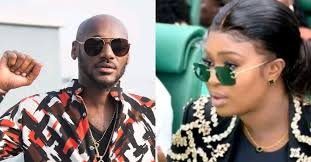THE INTERSECTION OF fame, politics, and social media has once again taken centre stage in Nigeria following the public declaration of love by music legend, Innocent Idibia, popularly known as 2Baba, for Edo State lawmaker, Honourable Natasha Osawaru.
The singer’s revelation, made in a video shared on his Instagram handle on Wednesday morning, comes amid his ongoing divorce from actress Annie Idibia, igniting a wave of speculation, debate, and controversy across digital platforms.
The Explainer gathered that 2Baba’s name has dominated online discussions since Monday after he was spotted at the Edo State Assembly, fuelling rumours of a deeper connection between him and Osawaru.
A subsequent video of the duo at a Lagos club only intensified public interest, with many accusing the lawmaker of playing a role in his marital troubles. Addressing the controversy, 2Baba took to social media to shut down what he described as “false narratives, false talk, and malicious nonsense.”
“So, allegedly, I’ve been seeing so many things, so many people coming up with their own false narratives after I posted that stuff,” he said in the video. “Any person wey get brain go understand. But for all the people who have been saying different stuff that don’t have an absolute clue about what’s going on, I hail you people. Your life is perfect, very right.”
The Explainer notes that while 2Baba’s love life has always attracted media attention, the current controversy has taken a different turn, largely shaped by the power of social media. Platforms like Instagram, X (formerly Twitter), and Facebook have become battlegrounds where narratives—true or false—are formed, spread, and amplified.
2Baba’s defence of Osawaru highlighted the toll of online scrutiny on individuals in the public eye. “Hon. Natasha has been dragged, she has been called all sorts of names, she has been labelled as a home breaker,” he lamented. “She is a young, brilliant, amazing woman, and she had nothing to do with what is happening between me and Annie in our marriage.”
While this statement sought to exonerate Osawaru, it also raised deeper questions about the evolving relationship between celebrity culture, personal privacy, and the influence of digital media. How much of a public figure’s life should be open to scrutiny? At what point does social commentary become digital harassment? These are the questions now shaping conversations around the saga.
The Explainer gathered that in an era where social media has blurred the lines between public and private life, celebrities and politicians are finding it increasingly difficult to control their narratives. With millions of Nigerians actively engaging in online discussions daily, personal relationships can easily become political or social flashpoints.
According to data from the Nigerian Communications Commission (NCC), the country has over 122 million active internet users, with social media playing a dominant role in shaping public discourse. This means that once a story gains traction, it becomes nearly impossible to contain, as was seen in the swift escalation of the 2Baba-Osawaru controversy.
Even though 2Baba insisted, “Yes I love her, she is amazing, she is cool, I want to marry her,” the reactions to his statement were deeply divided. While some commended his honesty, others criticised the timing of his revelation, especially given his ongoing divorce. The controversy has also placed Osawaru in an uncomfortable position, as her name is now being discussed in a context unrelated to her legislative work.
In recent years, Nigeria has witnessed a notable convergence of entertainment and politics, with public figures increasingly traversing the boundaries between these two spheres. This trend is exemplified by celebrities endorsing political candidates and entertainers actively seeking political office, thereby blurring the lines between entertainment and governance.
ALSO READ: Nigeria Moves Up in Global Corruption Index—Ranks 36th Worst
A prominent example is Desmond Elliot, a well-known Nollywood actor who transitioned into politics in 2015. He secured a seat in the Lagos State House of Assembly, representing the Surulere Constituency under the All Progressives Congress (APC). During his tenure, Elliot has focused on youth empowerment and community development, and he was re-elected unopposed in 2023.
Similarly, Banky W, a renowned musician, actor, and entrepreneur, ventured into politics by running for a seat in the House of Representatives for the Eti-Osa Federal Constituency in Lagos State. Although he did not win, his candidacy highlighted the increasing involvement of entertainers in the political arena.
Another notable figure is Richard Mofe-Damijo (RMD), a veteran actor who served as the Commissioner for Culture and Tourism in Delta State between 2009 and 2015. His tenure focused on empowering creatives and developing the state’s cultural infrastructure.
However, the Osawaru saga has raised concerns about how personal relationships can impact political careers, particularly for women in public service. Analysts argue that while the increased visibility could boost Osawaru’s public profile, it also exposes her to unwarranted distractions that could overshadow her work as a lawmaker.
For 2Baba, the situation is not unfamiliar. Having spent over two decades in the limelight, the artist has weathered numerous media storms. However, this latest controversy underscores how much social media has changed the nature of celebrity scrutiny. Unlike in the past, where traditional media controlled the narrative, today’s digital age allows anyone with a smartphone to influence public perception.
The fallout from 2Baba’s revelation has also reignited conversations about the need for responsible social media use. In his video, he jokingly suggested that authorities should step in to curb the reckless spread of misinformation.
The Explainer gathered that while Nigeria has laws regulating online harassment and defamation, enforcement remains a challenge. In 2015, the Cybercrime Act was introduced to address issues related to online abuse, but critics argue that it has been inconsistently applied. As incidents like the 2Baba-Osawaru controversy continue to unfold, calls for stricter regulations on digital discourse are likely to intensify.






















